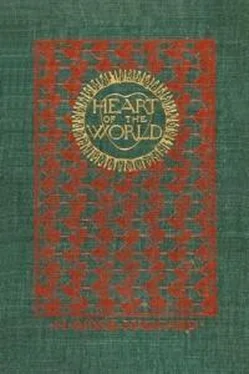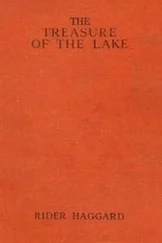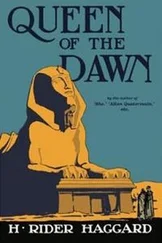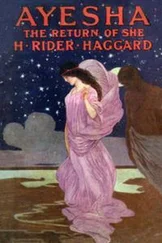The dawn was breaking and seldom perhaps has the light of day revealed a more wonderful or terrible sight to the eyes of man. Outside the gates of the courtyard of the pyramid were gathered a great multitude of people waiting to be admitted to celebrate the feast that on this day of the year was to be held, according to the custom, upon the summit of the pyramid. Indeed, they should have already been assembled there, but it was the rule that the gates could not be opened until the Council had left the Sanctuary, and this night the Council sat late. As we looked at them a cry of fear and wonder rose from the multitude, and this was the cause of it. Along that street which ran from the landing–place to the great square rushed a vast foam–topped wall of water twenty feet or more in depth by a hundred broad. Now we learned the truth. The symbol on the altar—I know not how—was connected with secret and subterranean sluice–gates which for many generations had protected the City of the Heart from flood. When it was torn from its bed these sluice–gates were opened, and the waters, rushing in, sought their natural level, which at this season of the year was higher than the housetops of the city.
On the summit of the pyramid were two priests who tended the sacred fire and made ready for the service to be celebrated. Seeing us emerge from the watch–house, they ran towards us, wringing their hands, and asking what dreadful thing had come to pass. I replied that we did not know, but that seeing the water gather in our prison we had fled from it. How we had fled they never stopped to ask, but ran down the stairway of the pyramid, only to return again presently, for before they reached its base their escape was cut off.
Meanwhile the terror thickened and the doom began. Everywhere the waters spread and gathered, replenished from the inexhaustible reservoir of the vast lake. Whole streets went down before them, to vanish suddenly beneath their foaming face, while from the crowd below rose one continuous shriek of agony.
Maya heard it, and, casting herself face downward upon the surface of the pyramid, that she might not see her handiwork, she thrust her fingers into her ears to stop them, while the señor and I watched, fascinated. Now the flood struck the people, some thousands of them, who were gathered on the rising ground at the gates of the enclosure of the temple, and lo! in an instant they were gone, borne away as withered leaves are borne before a gale. Ere a man might count ten the most of the population of the City of the Heart had perished!
For a little while some of the more massive houses stood, only to vanish one by one, in silence as it seemed, for now the roar of the advancing waters mastered all other sounds. Before the sun was well up it was finished, and of that ancient and beautiful city, Heart of the World, there remained nothing to be seen except the tops of trees and the upper parts of the pyramids of worship rising above the level of the lake. The Golden City was no more. It was gone, and with it all its hoarded treasures, its learning and its ancient faith, and that which for many generations had been held to be a myth had now become a myth indeed. One short hour had sufficed to sweep out of existence the ripe fruit of the labour of centuries, and with it the dwindling remnant of the last pure race of Indians, who followed the customs and the creeds of my forefathers. Doubtless their day was done, and the Power above us had decreed their fall; still, so vast and sudden a ruin was a thing awful to behold, or even to think upon. What, I wondered, would the founders of this great city and the fashioners of its solemn pyramids and Sanctuary have thought and felt, could they have foreseen the manner of its end? Would they, then, have set the holy symbol so cunningly upon its altar, that the strength of a maddened woman, by tearing it away, could bury altar, temple, town, and all who lived therein, for ever beneath the surface of the lake? This they did to protect their homes and fanes against the foe, so that, if need were, they could prefer destruction to dishonour; but they did not foresee—indeed they never dreamed—that this foe might be of their own race, and that the hand of one of her children would bring disaster, utter and irredeemable, upon the proud head of their holy stronghold, the city Heart of the World.
Now foot by foot the waters found their level, filling up the cup in which the town had stood, and the bright sunlight shone upon their placid surface as they rippled round the sides of the pyramid and over the flat roofs of the submerged houses. Here and there floated a mass of wreckage, and here and there a human corpse, over which already the water–eagles began to gather, and that was all.
Presently Maya rose to her knees and looked out from beneath the hollow of her hand, for the light was dazzling there upon the white summit of the pyramid. Then she flung her arms above her head and uttered and great and bitter cry.
"Behold my handiwork," she said, "and the harvest of my sin! Oh! my father, that dream which you sent to haunt my sleep was dreadful, but it did not touch the truth. Oh! my father, the people whom you would have saved are dead; lost is the city that you loved, and it is I who have destroyed them. Oh! my father, my father, your curse has found me out indeed, and I am accursed."
Some such words as these she spoke, then began to laugh, and turning to the señor, she said,
"Where is the child, husband?"
He could not answer her, but she took no note of it, only she bent her arms, rocking them and crooning as though the infant lay upon her breast, then came first to him and next to me, saying—
"Look, is he not a pretty boy? Am I not happy to be the mother of such a boy?"
I made pretence to look, but the sight of her pitiful face and of the empty arms, as she swayed them, was so dreadful that I was forced to turn away to hide my tears. Now I saw the truth. Weariness, sorrow, and shock had turned her brain, and she was mad.
We led her to the watch–house, where there was shelter, and the priests, who had returned, gave us food so soon as we could make them understand that we needed it, for they too were almost mad. Here her last illness seized the Lady Maya. It began with a hardening of the breast, which changed presently to fever. Two days and nights, with breaking hearts, we nursed her there upon the pyramid, striving not to listen to her sick ravings and piteous talk about the child, and at dawn upon the third day she died. Before she died her senses returned to her, and she spoke to her husband beautiful and tender words which seem almost too holy to set down.
"Alas!" she ended, "as my heart foretold me, I have brought you nothing but evil, and now the time has come for me to go away from you. Ignatio was right, and we were wrong—or rather I was wrong. We should have died together a year ago, if that were needful, sooner than commit the sin we worked in the Sanctuary, for then at least our hands would have been clean, nor would the blood of the people have rested on my head. Yet, believe me, husband, that when I did the deed of death, I was mad, for I had seen our child murdered before my eyes and I heard a voice within me bidding me to be avenged. Well, it is done, and I have suffered for it and perhaps shall suffer more, yet I think that I was but the hand or the instrument of Fate predestined to bring destruction upon a race already doomed, and on a faith outworn. That faith I no longer believe in, for you have taught me another worship, therefore I do not fear the vengeance of the god of my people. May my other sins find forgiveness, if they are sins, for it was my love of you that led me to them. Husband, I trust that you may escape from this ill–omened place, and live on for many years in happiness; but most of all I trust that in the land which you will reach at last, you may find us waiting for you, the child and I together. Farewell to you. This is a sad parting, and my life has been short and sorrowful. Yet I am glad to have lived it, since it brought me to your arms, and, however little I may have deserved it, I think that you loved me truly and will love my memory even when I am dead. To you also, Ignatio, farewell. You have been a true friend to me, though I brought you no good luck, and at times I was jealous of you. Think kindly of me if you can, though had it not been for me you might have attained your ends, and, as in the old days before we met, comfort my husband with your friendship."
Читать дальше












